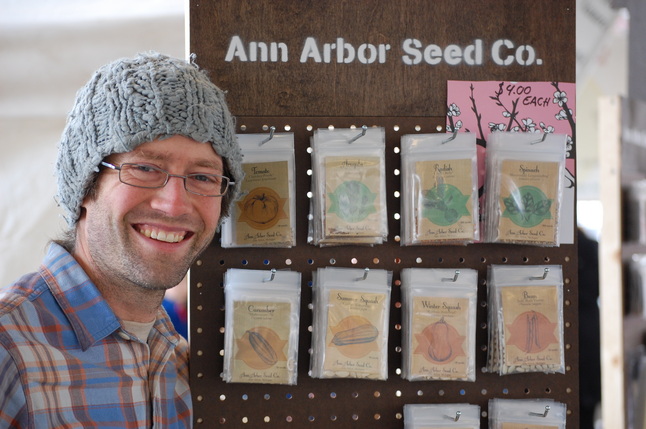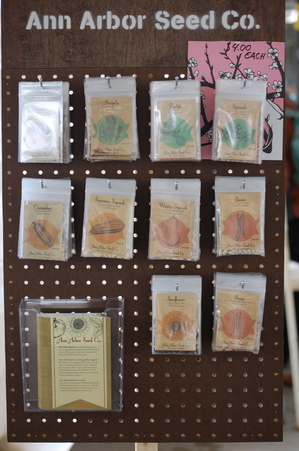
Ann Arbor Seed Company owner Eric Kampe with his first crop of seeds. He sells them on Saturdays at the Ann Arbor Farmers' Market. They also are sold at area stores, including Downtown Home and Garden in Ann Arbor and Project Grow in Ypsilanti. At least 20 varieties of garden vegetables are being sold.
Janet Miller I For AnnArbor.com
Literally.
Kampe’s Ann Arbor Seed Company is selling its first harvest of locally grown and organically raised vegetable seeds at area stores. Despite last year’s hot, dry summer, Kampe was able to collect, clean, sort and package seeds for 10 different garden vegetables, from arugula to sunflowers. Kampe said a couple more varieties may be added before the growing season begins.
“It was a good start for a brand new seed farmer,” he said.
Still, it wasn’t easy with the heat and drought, said Kampe, a former computer engineer. But the weather offered an advantage late in the season: Once plants bolt (go to seed), dry conditions are good, and protects seeds from rotting.
“Dryness is important for storing quality seeds well,” he said. “But during the tender phase, it was a challenge.”
While the local, sustainable food movement is burgeoning, Kampe and his wife, Meredith Kahn, who co-owns the business, offers the area’s only locally sourced seed company. The biggest successes were the Cherokee purple tomatoes — a juicy heirloom variety — and arugula.

Eric Kampe sells his seed packages at the Ann Arbor Farmers' Market every Saturday. They are priced at $4.
Janet Miller I For AnnArbor.com
He also harvested heirloom spinach seeds, a first for Kampe. Spinach is wind-pollinated, while most vegetable crops are pollinated by insects. And, unlike most other crops, there are male and female spinach plants, something that’s not apparent until they bolt.
“Seed producers get to see this while vegetable growers don’t,” Kampe said. “The female plants get larger and stalkier (when they bolt). The males release the pollen and then wither away. In a day, half of all the spinach is gone.”
There were disappointments: He came up empty-handed with lettuce — a crop he expected would be a strong seller.
“I had a total failure with lettuce,” he said. “I’d like to blame it on the hot, dry weather, which did have a role. But I didn’t plant it early enough. I knew there would be growing pains. This year, lettuce is my number one priority.”
Kampe learned seed farming when he worked on a farm near Boulder, Colo., that was a contract grower for Seeds of Change — a nationally distributed organic seed company. The University of Michigan graduate returned to Michigan to start Ann Arbor Seed Co. He rents three-quarters of an acre of land off of Tessmer Road, west of Ann Arbor.
For at least the 2013 growing season, Kampe is sticking to the same size plot of land, but expects to add seeds for beets, chard, kale, turnips and carrots to his seed catalog lineup next year. These crops are biannuals and won’t bolt until the second year.
Ann Arbor Seed Co. has racks at Downtown Home and Garden in Ann Arbor and at Growing Hope in Ypsilanti. They are also sold at Matthaei Botanical Gardens gift shop, at SELMA Café and on Saturdays at the Ann Arbor Farmer’s Market. They also will be sold at the Washtenaw Food Hub when it opens. Cost for a package of seeds is $4. For more info, visit their website.